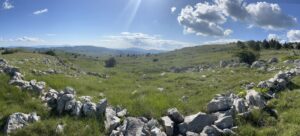Following concerns from local people, the Aarhus Centre in Sarajevo and CEE Bankwatch Network have started legal actions on the lack of environmental impact assessment and appropriate assessment for the 132 MW Poklečani wind project in Bosnia and Herzegovina (BiH). Hasty decisions by the Federation of BiH authorities and European Investment Bank might end up delaying the project for years.
Andrey Ralev, Biodiversity Campaigner | 19 June 2024

Poklečani in Bosnia and Herzegovina. Source: local people from Poklečani
‘A remote mountain village dominated by a small, cosy stone house over 100 years old, an equally old well and a hand-made stone fence. Sheep graze around the house and the surrounding area is characterised by many flowers, trees, colourful butterflies and chirping birds. Absolute silence, far from any electricity and water connections or country roads, surrounds this place.
This is not fiction but reality – a place called Stitar in Poklečani. The house in question, the well and the stone wall belong to my family and we have received high offers to sell it several times. Nevertheless, we always decided against it because we want to preserve this place in its tradition and culture.
In 2013, I accidentally found out about the plans to build this wind farm and contacted JP Elektroprivreda back then. Years passed and I received no information about the progress of the project. Until recently, I was not aware that JP Elektroprivreda was exempted from the environmental impact assessment for its project according to a decision from the Ministry of Environment and Tourism. The notice stated that the public had been involved. However, as a property owner, I learned about this project for the first time without the opportunity to raise objections, because the deadline had already passed.’

This is how a January 2024 complaint by local people to the European Investment Bank (EIB) on the 132 Poklečani wind farm starts. A month later, the Board of Directors approved a EUR 145 million loan to public utility JP Elektroprivreda Hrvatske Zajednice for the project.
Bosnia and Herzegovina certainly needs more renewable energy – it currently only has three operating wind farms. But Poklečani is planned in a mountainous region bordering the Blidinje Nature Park, or even partly inside according to some local people. It is also near the Duvanjsko Polje Important Bird Area. Blidinje and Duvanjsko Polje are also proposed for inclusion in the pan-European Natura 2000 network of protected areas.
Local people say that the wind farm would be too near to their houses and a cemetery and would entail the destruction of 350,000 m² of forest land.

The EIB violates its own standards
In 2022, the EIB approved its new Environmental and Social Standards, strengthening its biodiversity requirements and highlighting the need for all projects to comply with EU environmental law.
The Federation of BiH authorities exempted the project from carrying out an environmental impact assessment (EIA) – a decision which has been challenged in the local courts by the Aarhus Centre in Sarajevo. And the EIB accepted this decision.
This represents a breach of point 5 of the EIB’s environmental and social impacts standard and of the Energy Community Treaty, which requires BiH to adhere to the EU EIA Directive for energy projects. Considering the size of the project, its location near protected areas and inhabited areas, as well as its visual impact on the landscape, the project undoubtedly should have been subject to a full EIA.
´I know that the investor and the authorities in Bosnia and Herzegovina have so far had no scruples about disregarding legal aspects. However, it is unacceptable for a European Union bank, financed with taxpayers’ money, to actively support a project without due consideration of fundamental human rights and without carrying out an environmental impact assessment,´
write local people in communication with the EIB.
The project also violated point 23 of the EIB’s biodiversity standard by not carrying out an appropriate assessment (AA) on Blidinje and Duvanjsko Polje:
‘All projects likely to have significant effects on a Natura 2000 site, a protected and/or Key Biodiversity Area shall be subject to an assessment according to the EU Habitats Directive (i.e. an Appropriate Assessment).’
The EIB’s environmental appraisal did not detect this omission despite its obligation to verify projects’ compliance with the applicable legislation, even though it is well-known that environmental assessments need to be improved in BiH. The EIB’s own project documentation refers to the European Commission’s Bosnia and Herzegovina 2022 Report, which highlights that environmental assessment legislation needs to be
‘enforced and strengthened together with the necessary improvements in the access to information and the participation of the public in the decision-making process on planned investments.’
Request for Internal Review – an evolving tool for EU accountability
On 15 May 2024 CEE Bankwatch Network submitted a Request for Internal Review of the EIB Board’s Decision to approve the financing of the wind farm, based on the EU Aarhus Regulation. This Regulation grants eligible organisations the right to request an internal review in cases when an administrative act contravenes provisions of law relating to the environment. This was the case with Poklečani, because the financing of the project was approved without an EIA and AA.
This is not the first Request for Internal Review submitted by Bankwatch. Most recently, in March 2023, together with ÖKOBÜRO from Austria, a request was submitted against using the fast-track emergency procedure to adopt a Regulation to accelerate the deployment of renewable energy in the European Union, which undermines existing environmental law and public consultation requirements.The case is now at the European Court of Justice.
Faster deployment of renewables can’t and should not be done by limiting public participation
It might seem counterintuitive for organisations that promote a sustainable energy transition to challenge renewable energy deployment. But due to illegal and undemocratic decisions that undermine environmental safeguards and public participation, that’s what we’ve been compelled to do.
Renewables acceleration is crucial – as are public participation and environmental safeguards. The Poklečani case shows how limiting public participation will slow down the project rather than speeding it up. Early involvement of local communities would have resulted in a better project design, avoiding social and environmental impacts. Now, the legal challenges will put the project at risk – unless the EIB decides to fix its mistakes.
Never miss an update
We expose the risks of international public finance and bring critical updates from the ground – straight to your inbox.
Institution: EIB
Theme: renewable energy
Location: Bosnia and Herzegovina
Project: EU funds and biodiversity
Tags: Bosnia and Herzegovina | EIB | renewable energy | wind farm
